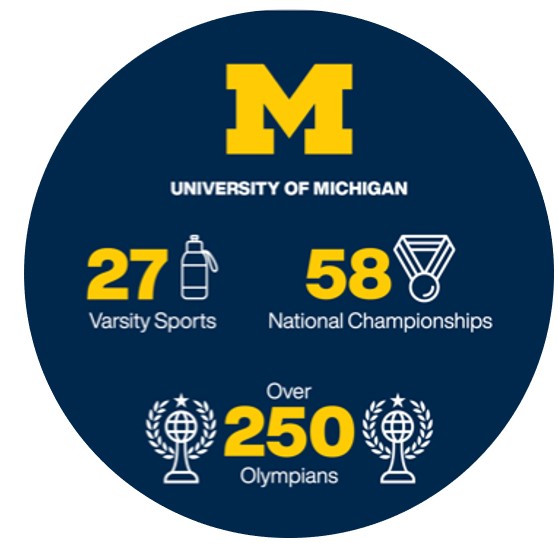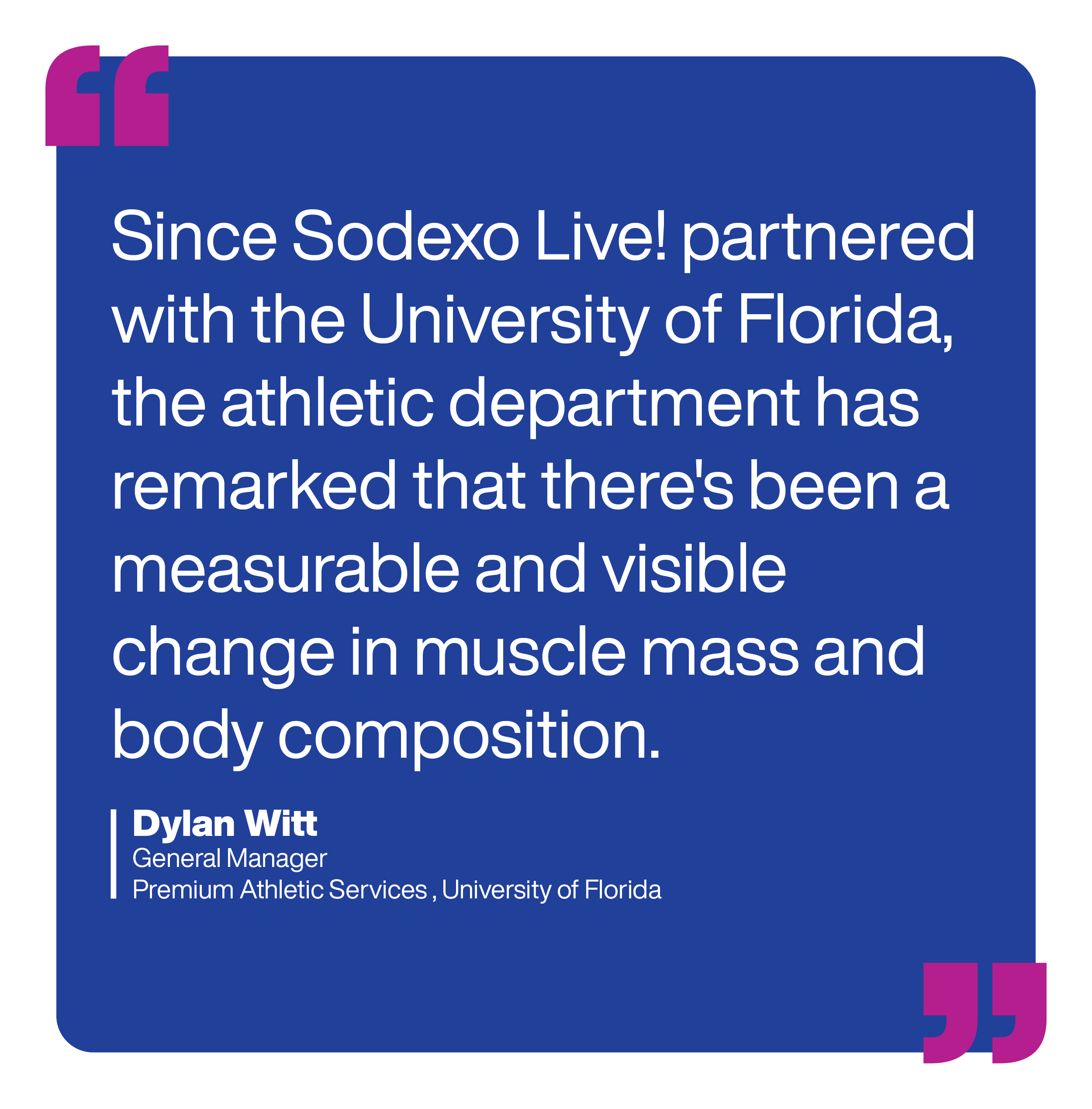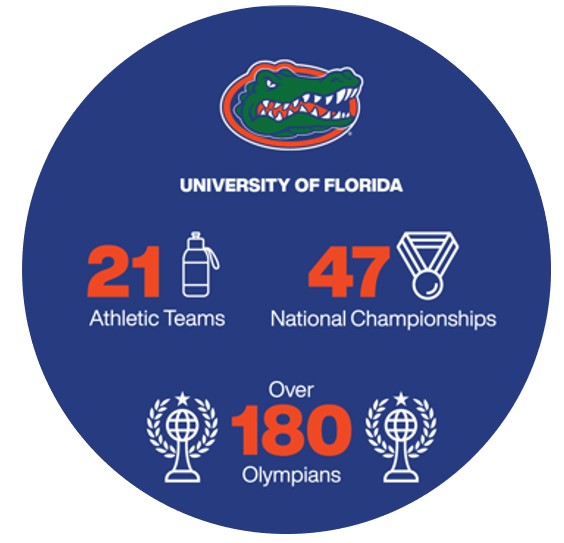With the 2024 Summer Olympics only months away, Sodexo Live! culinary teams across the world are working hard to prepare menus for almost 15,000 Olympic and Paralympic athletes. However, for our culinarians, fueling exceptional athletes is nothing new. Year-round, athletic programs at major colleges and universities trust Sodexo Live! to provide high-quality, nutritious meals designed for optimum performance and recovery.
In the fiercely competitive world of collegiate athletics, every advantage matters. Providing proper nutrition to student-athletes is essential for maintaining their physical health and enhancing performance, but it can also significantly impact a school's overall success and reputation. Major athletic programs invest significant resources to ensure that their student-athletes consume the best possible food, giving them a competitive advantage and boosting their reputation, recruitment efforts, and ticket sales.
The University of Michigan and the University of Florida, two of the country's top-ranking college athletic programs, look to Sodexo Live! to feed over 1,500 student-athletes. Learn more about what goes into nourishing these athletes with well-balanced, nutritious meals that optimize their performance both on and off the field.
The Food
Led by Executive Chef Chris Carr at the University of Michigan, the culinary team at t his NCAA Division 1 school creates food tailored to the needs of high-level athletes without compromising on taste. "It's different than most culinary research when you're looking for new recipes or neat new presentations," explained Carr. "We're looking at the structures of foods and what foods can do for the athletes." With the right nutrition and care, athletes can perform at their best and avoid injuries. Chef Carr asks for a full breakdown of the season to plan meals appropriate for the athletes' needs and nutritional requirements on any given day. "Sometimes our menu is not going to work, so we'll pivot. As much information as they can give us helps us develop what we will offer."
his NCAA Division 1 school creates food tailored to the needs of high-level athletes without compromising on taste. "It's different than most culinary research when you're looking for new recipes or neat new presentations," explained Carr. "We're looking at the structures of foods and what foods can do for the athletes." With the right nutrition and care, athletes can perform at their best and avoid injuries. Chef Carr asks for a full breakdown of the season to plan meals appropriate for the athletes' needs and nutritional requirements on any given day. "Sometimes our menu is not going to work, so we'll pivot. As much information as they can give us helps us develop what we will offer."
Sodexo Live! maintains a close relationship with the athletic department's dieticians and listens closely to students. "We're not just on an island. We have suggestion boxes and frontline staff listening to their requests and recommendations. We do our best to accommodate." When Chef Carr isn't in the kitchen, he dedicates his time to studying the natural properties of different foods. "Fresh pineapple, ginger, and garlic act as anti-inflammatories. Tart cherries can affect muscle and joint development. Even for basic things like ranch dressing, marinara, or meatloaf, I'm restructuring recipes," explained Chef Carr. "I'm taking the fat out, getting protein in, and even 'hiding' vegetables and things to boost the nutritional aspects of these foods."
In addition to having set staple items every day, the culinary team at Michigan keeps menus fresh and exciting. "A big piece of this to remember is that we are feeding kids. We need to ensure they eat to hit all their goals, but it doesn't have to be bland chicken and vegetables. We'll have Indian night with butter chicken or a Mediterranean and Greek theme. We still get to play around!"
The Science
 Crafting a precise diet plan for athletes is a complex undertaking. While the fundamental principles of sports nutrition, like drinking enough water, consuming carbohydrates to store glycogen, and replenishing with protein, apply to all sports, Sodexo Live! chefs go further by customizing meals to suit specific sports and even specific athletes. "For the football team, Tuesdays and Wednesdays are really heavy practice days," Carr explained. "We always have a section that is particularly rich in carbohydrates for running backs and high-calorie, anti-inflammatory options for linemen who need to be bigger, faster, and stronger in the trenches."
Crafting a precise diet plan for athletes is a complex undertaking. While the fundamental principles of sports nutrition, like drinking enough water, consuming carbohydrates to store glycogen, and replenishing with protein, apply to all sports, Sodexo Live! chefs go further by customizing meals to suit specific sports and even specific athletes. "For the football team, Tuesdays and Wednesdays are really heavy practice days," Carr explained. "We always have a section that is particularly rich in carbohydrates for running backs and high-calorie, anti-inflammatory options for linemen who need to be bigger, faster, and stronger in the trenches."
Even mealtime is carefully planned. "Knowing that it takes three to four hours to digest, we time when we serve meals so that the food will be converted to fuel when it comes time to perform," Chef Carr added.
The University of Florida has changed the culture of nutrition by implementing Notemeal to educate and empower its student-athletes. The app allows athletes to monitor their meals and receive personalized recommendations tailored to their needs and objectives. This helps them make informed decisions about what to eat and when, ensuring they are properly fueled for their sport. Notemeal also facilitates flexible meal ordering for pick up in advance. "These athletes are students as well," said Abigail Swartz, Operations Manager at the University of Florida. "They have a full class load, they're in and out of practices, they're going to recovery treatments, and just grabbing something between our scheduled meal services is not going to cut it." Using the app, student-athletes can access menus and choose the meal they want picked up on their specific timetable. The app has played a significant role in getting athletes actively engaged in their nutrition.
"We have combined food and hospitality with a sports nutrition mindset," said Swartz. "We not only ensure that no one misses a meal, but we also provide nutritional information for every ingredient we serve. The students and their dietitians can keep track of their nutritional goals by monitoring their meals throughout the day. Notemeal will notify them, for example, if they are at 50% of their daily protein and show them what they need to eat to achieve their goal."
The People
 Student-athletes at the University of Florida eat at the Gary Condron Family Dining Hall, a shining jewel of the University of Florida's Heavener Football Training Center. The Dining Hall isn't just an ordinary athlete cafeteria. It serves as the go-to venue for pre- and post-game meals, facilitates recruiting tours, hosts special events, and stands as a cornerstone of the University of Florida's athletic and dining experiences. The University of Florida partnered with Sodexo Live! in 2022 to bring this vision to life.
Student-athletes at the University of Florida eat at the Gary Condron Family Dining Hall, a shining jewel of the University of Florida's Heavener Football Training Center. The Dining Hall isn't just an ordinary athlete cafeteria. It serves as the go-to venue for pre- and post-game meals, facilitates recruiting tours, hosts special events, and stands as a cornerstone of the University of Florida's athletic and dining experiences. The University of Florida partnered with Sodexo Live! in 2022 to bring this vision to life.
Sodexo Live! played a crucial role in the Dining Hall's development, from conceptualizing and planning the kitchen to procuring top-of-the-line equipment. Over 500 student-athletes and athletics staff get meals from the Dining Hall daily. Stacey Higgins, Associate Athletics Director, Sports Health & Performance at the University of Florida, emphasizes that the story doesn't end there. "If they don't like the food, or they don't want to eat it, or it gets too repetitive, they're not going to go in that dining space," said Higgins. "And when that's where you go every day, not only does the food have to be great, the environment has to be welcoming."
Communication is key. "It takes a village to fuel these athletes. We have a committee that meets regularly to give feedback and understand where everyone is coming from," said Higgins. "The fact that Sodexo Live! is so receptive makes the experience fantastic."
Apart from offering nutritious meals that optimize student-athletes performance both on and off the field, the partnership between Sodexo Live! and UF has created a sense of community in the dining hall. "Feeding our student-athletes is our priority, but sharing a meal together is also really important," said Higgins. "It has brought the entire athletic population together. Even our mental health staff has said that this shared space has been amazing for the students."
"We have several Olympians here who will compete for their home countries in Paris. For our international athletes, the Sodexo Live! team has done an amazing job by asking for input on recipes. The students have requested some of their favorite foods, and the chefs make them feel a little more at home by preparing something they're used to eating."
"Professional teams will come and tour during recruiting season, and they're just blown away by what they see," said Dylan Witt, General Manager of Premium Athletic Services at the University of Florida. "They're not getting even half as many of the options we offer these students here."
